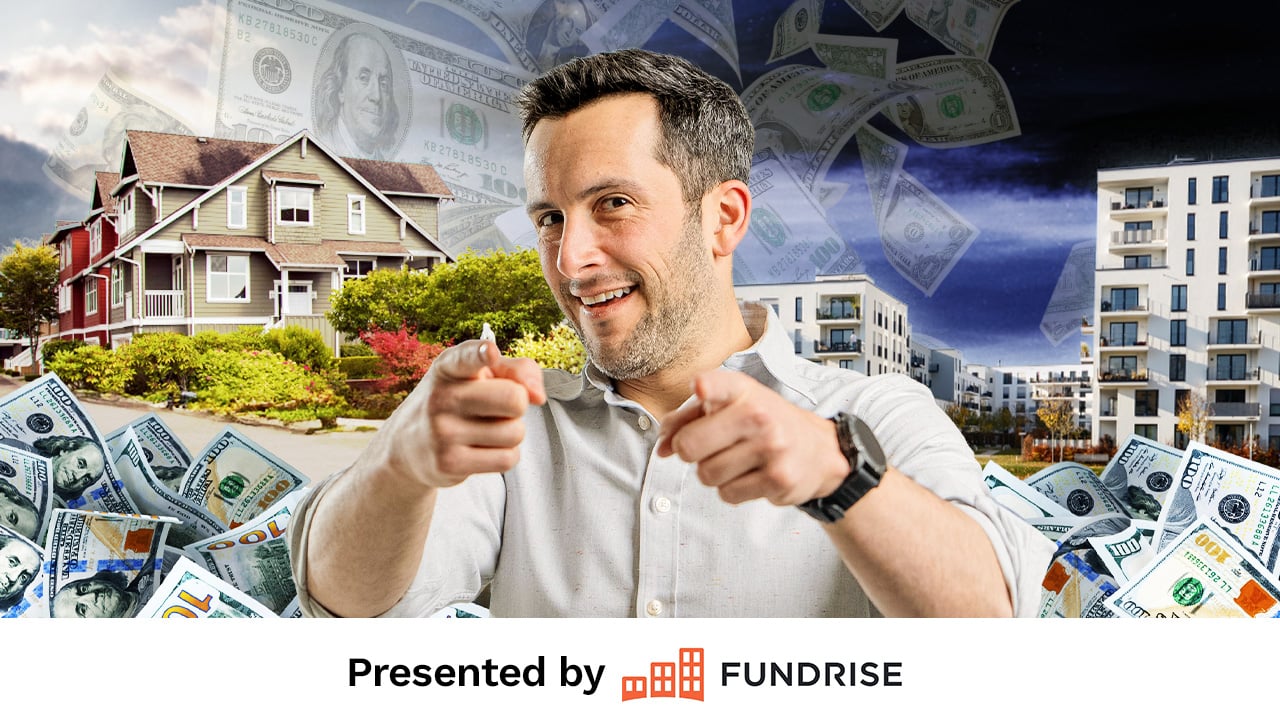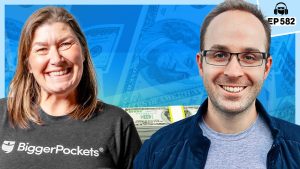
If you want to build a real estate portfolio or make more money off of your current portfolio, there are three steps you need to follow. Real estate investing experts who built massive passive income have used these three steps for decades without even knowing it. Now, Dave Meyer is sharing them with you so you can build wealth, find financial freedom, and live the life you love.
In his newest book, Start with Strategy, Dave goes over three crucial steps that the most successful investors have taken either before or while building their real estate portfolios. Today, we’ll walk through all three steps, helping you design the life you want to live BEFORE you buy investment properties, pick out EXACTLY which properties will help you get there, and learn how to make the most money with the least properties possible. No matter what stage you’re at in your investing journey, these three steps can help you hit your goals MUCH faster.
If you want to build wealth in 2024, pick up Start with Strategy and use code “START177” at checkout to get 10% off PLUS pre-order bonus content!
Henry:
What’s going on everybody? Welcome to On the Market podcast. This is Henry Washington and I am here with Kathy Fettke and I am introducing the show because Kathy and I are here to celebrate Dave Meyer’s new book, Start With Strategy.
Kathy:
Yeah, whoo-hoo.
Dave:
Thank you. Thank you guys. I appreciate you doing this.
Kathy:
Well, I think Henry and I want to understand how you’re able to come out with another book after giving an amazing keynote that I know took a lot of preparation, and a year-end completion and forecast. I mean, how do you do it?
Dave:
Just deep-seated anxiety about being inferior and not accomplishing enough. I don’t know, if you want the real answer.
Kathy:
You can put those fears to rest, I think.
Dave:
Oh no, I’m just joking. I’m lucky that I really like what I do. I really enjoy being a real estate investor and in my job at BiggerPockets and on this show, I get to talk a lot about data and market research, but I’ve also been a real estate investor for more than 13 years, and in the course of those 13 years, I’ve learned a lot about how to develop a strategy that works for me and my particular lifestyle.
For those of you who don’t know, I live in Europe, so I have to adjust my portfolio accordingly. I’ve gone to grad school, I’ve done all sorts of different things throughout my career and I’ve had to build a portfolio that is conducive to the things that I want and my particular goals. And so I decided to write this new book, Start With Strategy, to help people no matter what your background is, figure out what real estate investing strategy is right for you and put together an action plan to go out there and achieve it.
Henry:
I think this is amazing, because as someone who was new not that long ago I was one of the people that asked, how do I get started and what should I do? Not realizing that there’s no one-answer-fits-all for someone starting out. It really is dependent on you, where you’re currently at, what your goals are, where you’re going to invest. And then now as someone who is asked that question by people, it’s really cool to be able to have a place to point them to and say, this is how you go figure that out, so kudos to you.
Kathy:
And for somebody like me who’s been investing since before either of you were born I think, no 25 years ago-
Dave:
I don’t think that’s true.
Kathy:
Well, let’s see, you were in preschool maybe, but even so strategies change and you can have a plan and then 2008 wipes it all out and you got to start over and make sure you’re on course. Again, so many people just have their nose to the grindstone and forget to look up and make sure they’re still on track, or they even know where they’re headed. Why am I doing this? So many times people just flip, flip, flip, flip, forget to invest some of that money.
Dave:
Well, thank you both. I really appreciate it and I think anyone who teaches real estate or has been around this industry long enough, understands the idea here is that there is no right strategy. And that’s one of the main premises of the book is that there is no right strategy. There’s only the right strategy for you. Just like there’s no right perfect market, there’s only the right market that works for you in your particular situation. And so the book helps you figure out what your personal goals are and then matches you with the right strategies and tactics to help you get there. So we’re going to talk all about some of the frameworks and give you some really good information even if you don’t read the book about how to identify a good strategy.
But if you do want to check out the book, go to biggerpockets.com/strategybook and we are doing a special pre-sale. So if you actually buy before the launch, you’re going to get a free strategy planner. It’s a workbook that helps you actually create a plan. It’s like a business plan and you can write it all out in this planner, so you would get that for free. You’re also going to get live group coaching calls and all sorts of other bonuses. So make sure to check it out at biggerpockets.com/strategy. If you want to grab the book, make sure to use the code, START177, that’s START177, because that will give you 10% off the book and all the bonuses.
So to me there are basically three big broad elements that comprise real estate investing strategy. The first one is vision, which is basically where you’re trying to go and what you’re trying to accomplish. Because I’m sure as you two know, there are very, very different goals. Some people just want to modestly improve their financial situation, other people want to be tycoons and everything else in between. Some people start with modest means. Some people start with more means. And so I think the first step in strategy is establishing that vision.
Next, once you have a vision and know where you want to go, that’s when you pick what types of deals you should be pursuing. I hear people all the time be like, should I get into short-term rentals or flipping? And I’m like, I don’t know. I don’t know what you’re trying to accomplish. And so that’s why vision comes first and then what I call deal design comes second. And one of the things I love about real estate so much is that whatever your vision is, you can design deals that will work for you regardless of what your vision is.
And then the last step after vision and deal design is portfolio management. And I think this is one of the least discussed parts of real estate investing strategy, which is what do you actually do day to day? I know we all love to talk about buying deals, that’s surely the sexy part of it, but what about allocating your resources or mitigating risk or deciding if you should sell or refinance or how you’re going to scale? So if you combine these three things together, vision, deal design, portfolio management, those are the three things you need to create a personalized strategy that will help you reach financial freedom, whatever that means to you. If you guys are cool with it, I’d love to just go back and go through each of these vision deal design and portfolio management one by one. So let’s just start with vision. Does this sort of concept resonate with you, Kathy?
Kathy:
Oh, my gosh, a hundred percent. Our visions need to be looked at every year. So read this book every year in January maybe ideally, to revisit do I have the same vision? Because we change, we grow. When you’re single, you might have a different vision than when you’re married, and then when you have children, and then when your children are gone. And there’s so many phases of life, so revisiting the vision, it’s not stagnant. It changes all the time, not all the time, but over time. Like right now, one of the visions I have is, I’m not so interested in owning little rental properties all over the country anymore. I’m consolidating some of that and doing vacation rentals so that my family can get together and use those together, because my top priority is family time, but also to make income. So again, I wouldn’t have done that 10 years ago, because I was buying those little houses to get to a point where I could do this now.
Henry:
Yeah, Dave, I love that vision comes first for a couple of reasons. One is, I think a lot of entrepreneurs in any industry learn the lesson later after they’ve started their business, that they should have designed their business around the life they wanted to live and not design their business around how much money they want to make doing that thing. And so you become this entrepreneur and you end up becoming a slave to your business, because all you were focused on was growth and making money, when really what was truly important to you was being able to make money but not at the sacrifice of the time that I want to spend with my family.
And so when you think about on the front side what that is, if you want to prioritize time with your family, well then that will dictate the types of investing maybe that you should get involved in, or it will dictate the amount of processes and procedures you need to put into your business. So it may be harder for you to get to that money because you’re putting in so many automations on the front side, but the end result ends up in you living the life you want to live. And you can’t do that without a vision first.
The other thing I love is that personal values is the first question. Defining what those values are to you and letting that be a guide. And then I love that the first question is, what are your values? And the second question is, okay, but how much money do you have? Let’s be realistic about it. Let’s be realistic about how we’re going to approach this.
Dave:
I think it’s really important. People in real estate often call it finding your why. I call it personal values. But this might seem a little woo-woo so Kathy it’s right up your alley, but it’s not because every Fortune 500 company has values too. And if these companies, huge corporations, think it’s important to start with their vision, their values, then you should be doing the same thing. Real estate investing is entrepreneurship, and you should be investing with these end goals in mind. Just like Henry said, I’ve never flipped a house. I don’t know if I ever will, because it’s just sounds really annoying to me to be honest, and I just don’t want to do it. I have a pretty hard and fast rule that I try to keep my real estate investing at 20 hours a month or less.
You guys were joking about how I write books and write articles and stuff. Well, I’ve made a very conscious decision to not allow my portfolio to take up a huge amount of my time, because I have other professional interests other than investing in real estate. And so I think it’s really, really important, although it doesn’t sound like investing, to really get a clear idea of why you’re doing this and what you’re trying to accomplish.
And then to Henry’s point, then you got where the rubber meets the road is, all right, what do you got? And I think the key thing about the book is yes, we need to know how much money you have, but I go into this in the book, but money is not the only resource that you can commit to realize your vision. There’s also time and there’s also skill. When I got started, I had zero money. I was waiting tables. I literally didn’t have a bank. All my money was in my nightstand in cash and I had no skills whatsoever. But I had a lot of time. I had a lot of time where I could go look for deals and run the numbers and network, and I used that to start my portfolio.
And the point of the audit part of the vision where yes, you do talk about how much money you have, is you need to figure out what you can bring to your portfolio. Because you don’t need to have money, you don’t need to have time, you don’t need to have skills per se, but you do need to have one of the three. Sometimes you hear people like, I’m really busy, I’ve never invested in real estate and I don’t have a lot of money. How do I get started? Unfortunately, you can’t under one of those situations. So you need, as part of your vision to figure out which of those three resources you’re going to contribute. If you don’t have money, that’s fine, but you’re going to need to spend time on your portfolio. If you don’t have time, that’s okay, but you’re going to need to have money, you need to bring something. It’s literally a law of physics that you can’t create something out of nothing. And so what is the something you’re going to bring to your portfolio?
Henry:
So your book just doesn’t teach us how to hit a button and then we get properties that make money.
Dave:
I really wish it did. I wish there was a button that just wrote a book for you. That would be very easy too.
Henry:
I would buy that right now.
Kathy:
Having the vision actually makes the action part happen. I’ve had so many people come to our meetings at Real Wealth and they had no money and no time, and I just said, but just keep coming, keep learning. So they had obviously enough time to learn and to attend events and talk to people. And then they started to see the opportunities. They started to change the way they think. So the more that we get clear on that vision, the more you’re able to see that opportunity, and I can tell you people that I would look at and say, man, I don’t know how they’re going to get started, and then the next year they would somehow make it happen. They would either come into money, maybe there was an inheritance, maybe they got a new job, maybe they got a side job. So it’s like the education, that might even be above vision, right?
Dave:
Absolutely. But I think the point, if you have a vision and you do this audit where you look at your time and money, then you can identify your weaknesses. If I had done these audits when I first started, it would look pretty grim. I didn’t have a lot of resources, but I was still able to get clear about what I want. And that provided the motivation to get those resources. I did work a side hustle, I did educate myself to learn the skills, which is the third resource that I could contribute, because ultimately you have to get specific.
And I think there’s a tendency for people who are just getting started to be like, I just want a bajillion dollars, or I just want to quit my job. And in the corporate world, we do a lot of things about goal setting or smart goals or OKRs, these type of things where the point, the philosophy is, that the more specific you get about the goal, the more likely you are to achieve it. And I think that’s super important here. So don’t just say you want a billion dollars. If you do want a billion dollars and that’s a carefully thought out number, fine. But I think for most people it’s somewhere less than that. And what you’re actually after is not necessarily money, but it’s some lifestyle that you’re envisioning and so go write that out.
For me, I’ve always just wanted to travel a lot and real estate has enabled that to me, because I set that as a goal back in 2016. I said, I wanted to move abroad and I created a real estate scenario that worked for me. And you can do that by creating a very specific vision, whatever it is. I really think there are real estate strategies that work for you, but you have to spend the time and do some soul-searching honestly to think about why you’re actually doing this.
All right, so after vision, that’s when it comes to what I call deal design. And I think this is the part where people think it’s very fun, but this is where you align the different types of real estate investing out there with your specific vision. And I called it deal design for a very purposeful reason. People often call it, finding a deal. And I do think that there is obviously a big part of real estate investing that is identifying properties that you should buy. But I call it deal design because I just love this about real estate that there’s so many different levers you can pull to create a deal that works specifically for you.
Even if you know want to buy a rental property, how you manage that rental property, how you finance that rental property, what market you buy it in, what class is it in, what business plan you use to operate it, are all different ways that you can adjust this particular deal to fit your vision. And so in the book it goes through deal design and it basically explains the pros and cons, trade-offs of different types of real estate investing and helps you align with what your vision said.
I’m curious what you guys think about this. Henry, I know you do a whole bunch of deals. How do you think about designing deals that are going to work for you in your long-term strategy?
Henry:
It’s essentially what I did without knowing I was doing it, when I got started. What I wanted to do when I got started was to solve the problem of helping people find deals, because that was my safety net, if that makes sense. I knew if I could get really good at finding deals that I would be able to then keep the ones I really like, but then solve a problem that every investor says they have, which is it’s hard to find deals. And so it forced me to design my business in a way that was going to bring me those good deals and then that allowed me to do exactly that. I could then monetize these deals in the ways that I wanted to, that fit my investing strategy.
My investing strategy just happens to be long-term buy and hold, and fix and flips where I feel like I want to do that. But it all came from me designing my business in a way that was going to bring me the things that I wanted. And so it all turned out to feel like it was intentionally done, because the plan was upfront.
Kathy:
Listen when you get started, and I don’t know how many people listening are just starting or already have their strategy, but I can tell you when I started, I was so overwhelmed with excitement and overwhelm confusion, because I would go to local REA events and I would hear one guy talk about multifamily, and then the next week it would be a flipper, and the next week it would be a note guy, and then the next week… It was so many ways to make money and all of them are so sexy and all the speakers were so successful that I just wanted to do it all. But that’s not the way to go. Start with a strategy that you most understand or that you’re most excited about, and get really good at that and then you can go onto the other ones. Because it’s so easy to jump in these things that look great, but maybe you don’t understand enough and that’s when the strategy doesn’t work.
I, for some reason, I don’t know the 10th event or whatever, I heard this guy talk about his single family rental portfolio and I was like, I can do that. There was something about it.
Dave:
That’s the one.
Kathy:
That’s the one and it was the one, it still is the one. I’ve done lots of other things, but it’s a great time to be in single family, especially today, so it resonated. But go and find out about all the different strategies and then pick one.
Dave:
That’s a perfect anecdote, Kathy. I think so many people want to consider every possible strategy and that is just so overwhelming. There’s actually this great book I read called The Paradox of Choice. I won’t get too far into it, but it’s like basically everyone thinks they want a lot of choice, but when you get presented with a lot of choice, you just freeze. And it’s just one of the reasons for analysis paralysis.
And so I think the real point of the deal design phase of strategy is narrowing down all of those amazing options. And there’s no right or wrong, there are so many great options, but narrowing them down for just the ones that fit your vision and that as Kathy said, you can reasonably execute on. I totally agree with you, Kathy. Being a host of a podcast, we get to hear from the coolest people ever talking about the coolest stuff that they’re doing all the time. And every time I get off this podcast, I’m like, dammit, I should be doing that.
Kathy:
Why am I not doing that? Yeah.
Dave:
I have to ground myself a little bit and be like, okay, no, I can’t go out there and do what Henry’s doing or Kathy’s doing or any of our guests are doing. They’re not me. They have different circumstances and I got to stick to the plan that I’ve put in place.
Kathy:
A hundred percent. There’s so much FOMO in real estate, especially when you see all these things on Facebook and Instagram.
Dave:
Totally. Yeah, I mean this is a whole nother point, but I just think one of the reasons I wrote the book in general is just like, you’ve got to run your own race. You hear all these people telling you, you got to do this strategy or this is the only way to make money, and it’s honestly just nonsense. There are plenty of ways to make money, as long as you just dedicate yourself to being good at the things that you do and you actually want to do them, you’re going to do all right.
All right, so the last step of portfolio strategy after vision, which is where you want to go, and then deal design, which is like the how. Vision’s like where you want to go, deal design is how you’re going to use real estate to get there. And then portfolio management is like, what should I do and when should I do it? And where should I be doing it? Where should I buy deals? What does my buy box look like? Should I be selling, refinancing? Getting into the nitty-gritty of managing your portfolio.
And for me, this is the thing that took longest to get good at, or at least disciplined about in my real estate investing career. I was very focused on buying stuff. Everyone always asks, how many doors do you have? They don’t ask, do you have proper risk mitigation practices in place or anything like that because it’s not sexy, but it is super important. And people always want to know, should I buy, should I sell, should I refinance? And really these things come down to the same ideas. What are you trying to accomplish? What is going on in your portfolio? And so in this part of the book I created an entire Excel workbook that you get for free as part of the book that helps you track your portfolio and see how well different deals in your portfolio are doing, and give you some information to make these decisions. Do you guys look at your portfolio on a regular basis? Kathy, just curious, how often are you looking at what’s going on and how do you use that to make decisions about what you’re doing each and every day?
Kathy:
So coming back to the beginning, it’s like it’s so important to know who you are and what you’re good at. And I’m fortunate enough that I’m married to a man who loves to put together spreadsheets and analyze. So as a couple, and we try to teach people this all the time, especially couples, sit down once a week and look at your portfolio together. Hopefully one of you is a spreadsheet person. If not, get a bookkeeper or someone who is and sit down and look at it.
Rich and I once a week, we spend an hour look at our portfolio, look at asset protection. Do we have the right trust in place? Do we need to have a meeting with somebody to make sure? And then all that stuff doesn’t come up on date night, then date night could be date night and don’t talk about these things. But absolutely, yeah, we try to look at it every week because you can lose sight of, wow, I really have a lot of equity in this. It’s just dead equity. I could put it to you somewhere else. I mean, life changes quickly. Got to look at it regularly.
Henry:
Yeah, that’s exactly what I do. I look every week at my portfolio. Part of that is because that’s when I have a staff meeting every week, and so it forces me to look at the ongoing projects that we have. But that also gets me looking at my rent role and gets me looking at the property management reports and seeing vacancies and how all that’s being managed. So every week we’re taking a look at the portfolio as a whole, both on what we are owning and keeping and what we’re actively turning over. I
Dave:
I love that, because even if you only have two or three properties, sometimes you get so fixated on one that’s maybe a problem property, you’re spending all of your attention there and you’re missing opportunities or risks in other parts of your portfolio and you don’t recognize it. It’s not just about identifying vacancies or things. As Kathy said, sometimes you realize there’s equity trapped in a property that could be deployed elsewhere.
That’s actually, Kathy, why I started doing this tracking and created this spreadsheet. When I first started investing, I bought this four unit in 2010 or ’11 or something and I was so proud of how much equity was in it. I was like, oh my god, when I sell that one day I’m going to make so much money. And for three or four or five years I was like, this is going to be amazing. And then I joined BiggerPockets full time and I realized, oh my God, I have just been wasting all of this money. I could have bought all these other properties. I could have been using my resource so much better. And it was sort of this awakening that I committed to myself that I was never going to get caught in that situation again. So it’s not just about the boring stuff of looking through reports, it’s about finding opportunities and where your portfolio can continue to get better.
Henry:
I completely agree. I talked about this matter of fact at the BiggerPockets conference, I think it was Lika who had brought it up. The whole point was we were talking about deals and getting more deals, and one of the points that was made is the whole point of getting deals is to produce more income, build more wealth. And there’s not enough people talk about growth in terms of managing your current portfolio and seeing what optimizations you can make within that portfolio. And especially in a time like this where it may be more difficult for you to get that monthly cashflow, but what if there was some small updates you could make to existing properties that allowed you to get more rent and that allowed you to create more cashflow in your existing portfolio. Is that money better spent doing that than going out and buying a property where you’re probably going to break even right now at a 9% interest rate? So without having a vision and a structure and a portfolio management sitting right in front of you, it may be harder for you to do that.
Kathy:
I mean, that’s how our whole business even began, is I live in California and I would talk to people when I would go to those RIAs at these events and people would be like, oh, what do you mean you can’t cashflow in California? I cashflow. I’m like, how? Oh, we have the property paid off. Okay, I’m so glad to hear that you’re cashflowing.
Henry:
That little tidbit.
Kathy:
Exactly. But I’m like, but I’m buying all these cashflow properties in Texas and your property is a $1 million in California, but making $3,000 a month and you could triple that. You could triple your cashflow pretty much overnight. So portfolio management has been my thing for, again, 25 years because I’d scratch my head and be like, people aren’t counting the equity as money.
Dave:
Totally.
Kathy:
Right? Yeah. You wouldn’t put that much money down on a property and think it’s a good deal, but somehow because it’s there and you didn’t, that it doesn’t count. I don’t know.
Dave:
Yeah, absolutely. I think it’s such a good point. Imagine you had 50 grand, maybe you could use that as a down payment on a property that might get whatever, 2 to 3% cashflow right now in most markets if you’re lucky. But maybe you can add an ADU or finish out a basement or just do a cosmetic rehab that’s going to increase rent and pay yourself off relatively fast and you can actually earn a better cash on cash return by putting that money into your existing portfolio, than you would acquiring something new.
And I know this took me a long time to figure out, because we, in the real estate industry, people talk a lot about doors and honestly, I just hate that. I think it’s so crazy that people focus so much on doors, because you can have a lot of crappy properties and have a lot of doors. And honestly, some of the people I know who have fewer doors are making a lot more money, because they’re extremely efficient with their properties and they’re very good at operating their businesses. So I don’t know, I’m going on a diatribe there, but I just think managing your portfolio, being very aware of what’s going on in your portfolio is going to really help you achieve your goals. Honestly, with less work, it’s going to make less headache and make it easier for you throughout your investing career.
Kathy:
I just want to jump in and say that you nailed it, that a lot of times it’s something else driving people, like ego versus the actual vision. And that ego for so many years was, I have hundreds of doors. And you’d go to these events and people felt bad if they’re like, well, I only have 20. I must be a big loser. But then you find out later that these people maybe just invested in a syndication. They don’t own 50 doors or 1,000 doors or-
Dave:
Exactly. It is such nonsense, yeah.
Henry:
Real estate investor mass.
Kathy:
It’s a lie.
Dave:
That’s actually one of the reasons I wrote the book is at one of the BiggerPockets conferences, someone came up to me and was like, Hey, I’m just a newbie. I only have 37 doors. And at first I was like, are you freaking crazy? You’re more advanced than 95% of the people here. But honestly, it kind of made me sad. I was like, man, you’re sitting here having accomplished a lot that more than most people ever will, and you’re feeling apologetic about that or some reason that you haven’t accomplished something.
And it just makes you realize it’s driven by ego, because I’m sure that person is probably doing well financially. And hopefully maybe this part of this book will normalize the idea that you don’t need a certain amount of doors, you don’t need a certain amount of time, you don’t need anything in particular. Whatever it is that you want, just go pursue it and find the real estate investing strategy for you. But don’t go pursue a ton of doors just for the sake of it, because honestly, I could buy a lot of doors right now and it would probably worsen my portfolio performance than if I just focused on what I got or remained really disciplined to what I’m trying to accomplish.
Kathy:
And what you’ve been accomplishing is travel. You just got back from Thailand, so pretty cool. I would say you’re on target.
Dave:
Exactly. Exactly. My real estate plan is working. I’m proud to say that. All right, well thank you both so much for coming here and talking about my book. I really appreciate you taking the time.
Kathy:
It’s really cool and it’s going to help a lot of people, so I’m glad we could talk about it and share it.
Henry:
Yeah, thank you. It was a fun exercise to go through. I literally have it sitting up. It’s been opened on my screen for a few days and it’s really cool to just have all these metrics right in front of you in an organized way, so I think it’s going to help a lot of people.
Dave:
Awesome. Well, thank you. And if you are interested in building your own real estate investing strategy, getting all the frameworks and exercises that walk you through all the important decisions that you need to make as a real estate investor, make sure to check out the book. The presale is still going on. You get all those goodies that we talked about at the beginning, and you’ll also get my eternal gratitude for buying my book. If you want to grab the book, go to biggerpockets.com/strategybook, and when you’re there and checking out, make sure to remember to use the code, START177. That’s START177 because that will get you 10% off the book and all the bonuses.
Thank you all so much for listening. We will be back in just a couple of days with our normally scheduled episode of On The Market.
On The Market was created by me, Dave Meyer and Kailyn Bennett. The show is produced by Kailyn Bennett, with editing by Exodus Media. Copywriting is by Calico Content, and we want to extend a big thank you to everyone at BiggerPockets for making this show possible.
Help us reach new listeners on iTunes by leaving us a rating and review! It takes just 30 seconds and instructions can be found here. Thanks! We really appreciate it!
Interested in learning more about today’s sponsors or becoming a BiggerPockets partner yourself? Email [email protected].
Note By BiggerPockets: These are opinions written by the author and do not necessarily represent the opinions of BiggerPockets.





